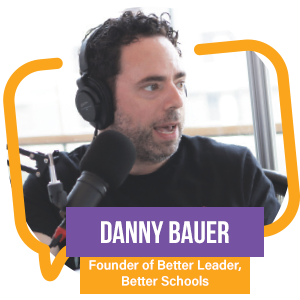
Empower Teachers to Build Your Team
Leverage learning networks, communities of practice, and mentoring to strengthen school leadership.
Topics: Mentoring and Coaching, Teacher Effectiveness
Staffing is a challenge for schools throughout the country. Even in elite schools, it’s difficult to attract and retain staff to a stressful career that often promises only a modest salary. But Houston Independent School District principal Shelby Calabrese and assistant principal Alejandra Perez have established a framework that distributes leadership and builds culture to keep staff.
In a Q&A held during UNITED: The National Conference on School Leadership in July, educational consultant, speaker, and podcaster Danny Bauer interviewed Calabrese and Perez, who presented a session titled “Empowering Leadership: Strategies for Cultivating a Strong Team,” which outlined four steps critical to building a team: trust, culture, systems, and recognition.
“We can’t do it all,” Calabrese said. “We have to trust people and empower others to lead a lot of the work in their grade levels. That starts with the hiring process. Systems are crucial, [and] you have to give credit where it’s due. It’s hard work, but it’s not just us doing the work.”
Here’s an excerpt of what the participants had to say about using learning networks, communities of practice, and mentoring to connect with other educators, learn best practices, and find support for themselves while strengthening their school’s leadership pipeline and providing faculty and staff with the same opportunities for growth.

Bauer: Can you break down what works for you on campus, systemwise?
Perez: For the leadership team, we go through a whole process. We began with a survey of the entire staff, [asking them] what they’re looking for in their team, how they can support it, and to nominate different team leaders for the position itself. We review their responses and determine who would be the best fit for that team. Then, we invite the teachers to be a part of a leadership team, they sign a contract, and we notify the teachers and staff.
Bauer: Talk to me about the contract. Why do you do that, and what’s in it?
Calabrese: I think the clarity—just being clear on what’s expected of the role and responsibility of being a team lead. It’s not just that you’re the loudest one in that grade level or you’ve been there the longest. A lot of times, the team lead isn’t someone who wants to pursue being a school leader; they’re someone who is a strong instructional leader. They are competent when it comes to strategies and practices and systems within their classrooms. Someone who can take [our] vision of the school and push that to their team. You have to have people who are on the same page as you.
Bauer: Let’s talk more about culture. In my view, you want your staff to want to answer two questions: (1) Am I doing a good job? and (2) Do I belong here? Part of that is trust—those relationships. Any germs of wisdom you want to share around building culture?

Calabrese: As a principal, being in the work and being present—being visible—[are key]. And that’s difficult to do when you have to get stuff done and there are deadlines. But being in the work has made the biggest difference on our campus because we have teachers do x, y, z, and we’re in the work doing x, y, z with them. There’s buy-in.
Recognition is important. I have a background in sports. I write [thank-you notes] on baseballs. A lot of times, it’s not for something I’ve asked for, so staff has just stepped up. That’s what I love about the culture I’ve created: It’s a we, it’s an us, it’s our campuses, it’s our school.
Bauer: What do you think it is about the environment that [makes] people step up? You have people going above and beyond, [but] you want them to replicate what you’re doing.
Calabrese: I really push to our staff to be risk-takers. It’s OK if you fail, but you’re never going to grow if you don’t take risks. We live in this world of constant change and evolution, and just being open-minded [is important].
Bauer: Can you share a story about staff recognition? Do you have a staff member of the month award or anything like that?
Calabrese: We do an IB [International Baccalaureate] Teacher of the Month. Just like the baseballs, it applies a bit of positive peer pressure, because some staff members don’t get nominated. Everybody’s part of the nomination, and there’s a winner who is tied into our core values.
Bauer: Dr. Perez, talk to me about learning networks. How are you plugged into learning networks? What supports you as you grow your leadership skills?

Perez: Well, I have an amazing mentor in Dr. Calabrese. I see a lot of the systems she has developed. And being a lifelong learner and engaging in different types of professional development helps [me] refine those skills and learn new things. You’re seeking professional development, looking up to your mentors, and learning from your teacher leaders—leveraging their capacity, as well. That way, we’re all growing together toward the same vision and mission.
Bauer: Dr. Calabrese, how are you taking risks?
Calabrese: Professionally, being a part of a large school district is challenging because a lot of the changes don’t pertain to my campus. Since my campus is a very high-performing campus, a lot that comes down the pipeline from upper leadership really doesn’t align with the work we’re doing. So, the risk-taking comes in where I have to manage up a little bit. I have to say, “No, this isn’t appropriate for my campus.” It ruffles feathers, but when there’s data or a reason, I can tie [my input] back to what’s best for students.
Bauer: There [might be] fragile egos in central offices. What do you see as most effective when leading up and advocating for yourself?
Calabrese: I definitely think a face-to-face is always best: “Hey, can we jump on a [Teams call]?” I think it’s just using the data. At a campus like ours, almost half the students are gifted and talented. We’ve been IB for 15 years and have certain curriculum waivers. Knowing this is who we are, we just take time to pull the leaders in and explain it to them. It’s having the conversation and the data to back it up. We found that happy medium.
Bauer: A while ago, we spoke about transparency and building trust. Can you describe a moment when you were actually transparent with your staff?
Calabrese: There was a complete change in our attendance policy in the district in September 2023. The district came in and said, 10 days is what you’re allowed to take, and you can’t take them on a day before a professional development day, you can’t take them the day before a holiday, and so on. [The district got] very strict about it, and teachers started to get fired. But [I told my people] I understand that things happen.
A brand-new, 22-year-old, first-year teacher got very sick and didn’t have any days left because her grandmother had passed away earlier in the year. She was in tears in my office: “I don’t want to get fired.” I had the conversation with upper leadership: “You’re going to see me approve this day, but she’s very ill.” I put myself in the teacher’s shoes—and in their mind, they’re thinking they’re going to be fired, period.
Bauer: Dr. Perez, as an aspiring principal, what’s been something you’ve learned recently that’s been helpful?
Perez: Well, in terms of transparency, one thing that I’ve learned is that a lot of the changes in the district [have made] a lot of the teachers become overwhelmed—very stressed. You can sense it in the room. It’s important to be able to disseminate information coming from the district in a manner that helps teachers calm down a little, feel a little bit better, and reminds them that we’re such a high-performing campus that a lot of these new initiatives are not going to affect us.
Bauer: So, you’re in your third year as principal, Dr. Calabrese. What’s been one of the biggest leadership lessons or epiphanies you’ve had as principal?
Calabrese: That it’s OK to not know the answer. And I would say equally that my biggest takeaway is loving your people and taking care of your people. It’s hard work, so I acknowledge the fact that you are a human being or a mother first.
Perez: It makes all the difference. I’ve been under many leaders who have not had that mindset. It’s difficult to do the work when you’re under that type of leadership versus when you’re under someone who values you as a human being.
Bauer: So, you do coaching and mentorship, obviously. Do you have a coach or a mentor?
Calabrese: I’ve had a couple. Teresa Campos was my mentor during my doctoral. She’s retired now, but she’s a phenomenal mentor. She didn’t tell me the things that I maybe wanted to hear as a first-year principal. She was the one who really advised me to get to know my people. I learned from her to approach every situation with kindness.
[I try to learn] from anybody and everybody on campus. I just learned recently from our kitchen manager; [she] taught me some things about safety, and we’re going to bring her in on our safety committee. Be open to learn from anybody and everybody who has something to contribute.
Bauer: Is there a thorny issue you’re facing right now that I can help you process?
Calabrese: There of course are thorny issues. Going into the school year with [the state’s] takeover of the district, there’s still a lot of uncertainty. I’m doing a lot of sense-making with the community, and the staff has a fear of an unknown. We’re implementing what we need to be implementing—the changes that are appropriate for our school. I am an open-minded person, and I welcome change. We want to push these initiatives forward, so the thorn is that I still want to do what’s best for our campus.
Bauer: What would you like to highlight most from what we’ve discussed today?
Calabrese: I think just sticking to your core values. [At the root of] every decision that’s made, every conversation that’s had, any change that comes down the pipeline is that we have to put students first and do what’s best for them. I always ground myself in that. And to use your people. You can’t be an island.
Perez: Right—you can’t do it on your own. That’s one thing I’ve learned for sure: to lean on those around you. You’re there for a purpose, and that’s to push forward.

